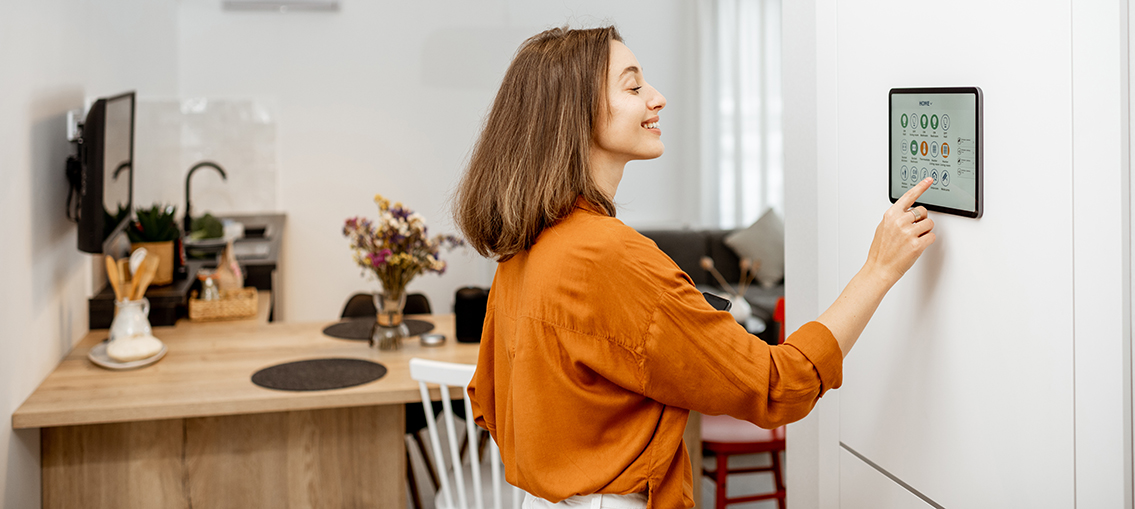Smart Home Technology is catching on with homebuyers and homeowners as a way to upgrade their home's energy efficiency, convenience, comfort, and safety. According to Statista, almost 37% of households in the United States own a smart home device. All signs point to this trend becoming increasingly commonplace as homeowners continue to adopt the technology and new home build feature them in their construction.adopt the technology and new home build feature them in their construction.
What is a Smart Home?
A "smart home" refers to a residence that employs devices connected through the internet to automate, monitor, and manage various appliances and systems throughout the house. The multiple devices are connected and accessed through a central point, often a smartphone, tablet, or central hub. The home automation system can control thermostats, locks, lights, cameras, televisions, monitors, and appliances. This network of physical devices working together to collect and share electronic information is Internet of Things (IoT) technology.
Users can create schedules to automate various devices and functions, such as dimming the light across the home at a specified time. The programs often feature self-learning to better adjust to the habits of residents. Features like these help homeowners feel greater comfort in their homes and save money through increased energy efficiency. Additionally, the home automation system can alert the homeowner of unordinary activity such as an electric power surge or call authorities if any dangers such as a fire or robbery are detected.
Smart homes systems can be connected wirelessly or hardwired, or a combination of both. Wireless systems are much easier to install, especially for existing homes, and are more affordable for homeowners. Hardwired systems are categorically more dependable and offer greater protection against hacking. While they provide increased resale value to your home, retrofitting a hardwired system to your existing home can be pretty pricey relative to installing a wireless system. Installing a hardwired system is much simpler and cheaper during a new home build, becoming more popular due to homebuyers' increased demand for these features.
Types of Devices and Their Functions
There is no shortage of options for homebuyers and homeowners who wish to add more smart home devices to their homes. Companies like Google, Amazon, Apple and many others offer numerous smart home technologies to build your smart home system. Here are some of the specific devices and their functions that you may consider adding to your home:
Smart Thermostats
Smart thermostats allow users to schedule, monitor, and remotely control their home's temperature. A vital aspect of these devices is their ability to learn the homeowner's behaviors, habits, and preferences to operate at the optimal energy efficiency while providing the most comfort. They will also keep track of the energy use of the heating and cooling system and provide timely reminders such as changing air filters.
Smart Lightbulbs
Smart Lightbulbs allow the user to control the smart lighting system remotely and customize the light precisely to their liking. Some smart lightbulbs even feature motion detection, turning on when someone enters the room, and can even regulate themselves to balance out any daylight that might be shining into a room.
Smart Locks
Smart locks for the home's entrances and smart garage-door openers allow users to remotely grant or deny access to their guests and visitors.
Smart Security Cameras
Smart Security cameras allow residents to monitor and record their home and property when they are away for extended periods, such as working or on vacation. The smart motion sensors can identify the difference between residents, visitors, pets, and burglars and notify the authorities if anything suspicious is detected.
Smart Appliances
There are smart appliances for all your home needs. For your kitchen, you can find automated coffee pots and slow cookers that can be programmed to start and stop at certain times and smart refrigerators that keep track of expirations dates, make shopping lists and offer recipe ideas based on the food inside. In your laundry room, smart washers and dryers can send you alerts when cycles are finished, monitor energy use, and identify any issues in the machines.
System Monitors
System monitors are helpful for homeowners to keep an eye on things such as the electrical system or plumbing system. They can detect issues such as an electrical surge or freezing pipes and turn off the associated utility, ultimately preventing a more significant problem from developing.
Smart TVs
Smart TVs connect to the network and access shows and programs through various applications and streaming platforms. Some models offer voice or gesture recognition as well.
A critical consideration for homebuyers and homeowners looking to buy smart devices for their homes is that products from one company will not likely be able to communicate and network with products as seamlessly as products from the same brand. You may need to use various apps to control each specific device instead of one central hub controlling multiple devices. A universal connectivity protocol, Matter, is currently being created to address this concern and allow all devices to work together seamlessly, regardless of their brand. However, the first version is not set to launch until later in 2022.
Smart Home Buying
This month's Reporter cover story discusses what inspectors need to know about smart homes during their inspections. In the article, author Mark Goodman discusses some helpful questions that inspectors can offer their clients to use during their home viewings or when they take ownership of the home. Using his inspection experience as an ASHI Certified Inspector (ACI), a membership level reserved for those who meet rigorous standards and requirements, and extensive research on the topic of smart home technology to develop these questions, you can ask the seller:
- What devices are used in the home?
- Do you have a hub or hubs, and if so, what type, and will you be leaving it?
- Do any of the smart devices require monthly fees?
- Do I need passcodes to reprogram them, and will they be reset to the factory default settings?
- Are the devices wireless or hardwired?
- Can you provide a list of the devices and where they are located?
Asking these questions can help homebuyers understand the smart home system and have a smooth transition as they move into their new home and begin to personalize the settings of the smart home technology.
Smart Home Inspections
Home inspectors will often follow a standard of practice to ensure that clients understand the scope of their work and that the home is appropriately inspected. For example, ASHI members must adhere to the ASHI Standard of Practice, which is one of the most widely accepted standards in our field. Currently, there is not a dedicated section for smart home technology. As smart home technology becomes more commonplace, the Standard of Practice and the home inspection industry will need to evolve to address this home technology category.
However, smart home technology presents some obstacles for prospective homebuyers and home inspectors. Many smart home devices require electricity and an internet association to operate. Internet connection likely won't be an issue for an existing home with the seller currently residing there. However, if they have already vacated the house, you may not be able to access the devices' functionality. Further, access to these devices might be hindered if there is no central hub or the required password to access the smart home automation. Typically, smart devices have the basic mechanical features unlocked, such as turning lights on or off, but the more in-depth smart features may not be accessible.



